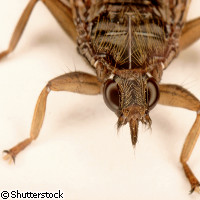EU-funded research shows that lice can be nice
A UK study has found that exposure to parasites such as lice might have some beneficial effects in mammals. The researchers, supported in part by an EU Marie Curie fellowship, looked at wild mice infected by a range of parasites and observed that the louse Polyplax serrata had a dampening effect on certain important immune responses. The results, which have implications for the study of immune dysfunctions in humans, are published in the journal BMC Biology. Humans and other mammals living in parasite-free environments, which are the norm in developed countries, are largely protected from parasitic infections. Although this makes life comfortable, scientists have long held the belief that there is probably a link between reduced infection exposure and the recent increases in allergic and autoimmune disorders such as rheumatoid arthritis and diabetes. Professor Jan Bradley of the University of Nottingham in the UK explained, 'Much like laboratory mice, people in developed countries are currently exposed to a very different profile of infections to that encountered by their ancestors. It is possible that the immune dysfunctions we see today are the result of immune systems moulded by evolution for a set of challenges completely different to those encountered in modern times.' The researchers studied wild mice from a Nottinghamshire forest that had been infected with a variety of parasites. The team developed a novel assay to study toll-like receptor (TLR)-mediated immune responsiveness in the wood mouse Apodemus sylvaticus, and investigated the relationship between parasitic infection and the normal state of immune activation in the mice. The fact that the mice were wild was central to the researchers' efforts. Immune system research has so far largely relied on studies of laboratory mice, which are raised under highly unnatural pathogen- and stress-free conditions. 'Analysing the immune response in wild populations can give crucial insights into how the immune system functions in its natural context,' Professor Bradley said. The findings were surprising: while both Heligmosomoides polygyrus (a roundworm) and P. serrata (a louse) had a direct effect on immune activation, the dampening effect of the louse on immune activation was remarkable. This could have been due to any number of reasons, the researchers said. One possibility is that the louse secretes some substance directly into the mouse which impacts immune function; however, it is equally possible that the louse acts as a carrier of some other, as-yet-unidentified pathogen which has some immunosuppressive effect. Whatever the mechanism, the researchers say, the effects of the parasites on immune response against a range of different infections supports the view that 'modern parasite-free human and domesticated vertebrate populations may exist at levels of innate immune activation much greater than would have been typical during their recent evolutionary history'. The findings are important for the study of over-active immune responses (wherein the immune system attacks the body's own cells or harmless substances rather than those of foreign invaders) in humans, which cause health problems such as rheumatoid arthritis, asthma, diabetes, multiple sclerosis and allergies.
Countries
United Kingdom



